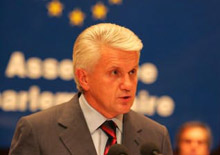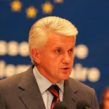
Political Instability in Ukraine Raises Fears of Intervention by Security Forces
Publication: Eurasia Daily Monitor Volume: 6 Issue: 74
By:

Ukraine, together with Latvia and Hungary, are the three post-communist countries hardest hit by the global financial crisis. Ukraine’s crisis is made worse by political instability and political in-fighting, as seen in the second failure on April 13 to adopt legislation required by the IMF before it releases the second tranche of its stand-by agreement to Ukraine.
Opinion polls suggest as many as 76 percent of Ukrainians do not feel "protected" by the state from internal threats (Ukrayinska Pravda, April 1). Interior Minister Yuriy Lutsenko has threatened to deal harshly with what he believes to be the inevitable "revolution" and "social explosion" caused by unemployment. The unregistered NGO Shchyt (Shield), drawn from security service veterans and Interior Ministry (MVS) cadets, recently destroyed a peaceful protest and volunteered to "counter anarchy, corruption and paid for political actions in order to bring order to Ukraine" (Ukrayinska Pravda, March 21). Shchyt promised to "assist in undertaking order on the streets of our cities" (Ukrayinska Pravda, March 27).
Politicians incessantly debate the possible consequences of pre-term presidential and parliamentary elections and whether there is sufficient time or enough parliamentary votes to change the constitution again (the last time being in 2006). While there is also continued speculation concerning a possible impeachment of President Viktor Yushchenko.
Lytvyn’s warnings are reminiscent of ex-President Leonid Kuchma and his presidential administration head Viktor Medvedchuk attempting to extricate themselves from impending election defeat. The current political atmosphere is similar, with Yushchenko now in his last year in office, and his chief of staff Viktor Baloga exploring ways to remain in politics and receive immunity from prosecution. To achieve this, Yushchenko and Baloga have three options: the use of force to introduce presidential rule, becoming a life senator if Yushchenko’s constitutional reforms proposed on March 31 are adopted (leading to a bicameral parliament), or being elected to parliament through simultaneous elections on October 25.
The second failure to adopt IMF-mandated legislation rested on the lack of support from the United Center and For Ukraine, two pro-presidential wings of the Our Ukraine-People’s Self Defence (NUNS) faction. The two groups, accounting for 27 of the 72 NUNS deputies, are holding Ukraine to ransom because Yushchenko and Baloga desperately want simultaneous elections in order to transfer from the executive to parliament and receive immunity. This would protect them in the event of Yulia Tymoshenko being elected president. The Tymoshenko bloc (BYuT) political scientist Oleh Medvedev suggested that Yushchenko, in seeking to bring down Tymoshenko, might inadvertently destroy Ukraine (Ukrayinska Pravda, April 14).
First Deputy Prime Minister Oleksandr Turchynov warned that "in the presidential team there is a persistent desire to utilize the security forces -Security Service (SBU) and Procuracy- to defend its political and corporate interests" (Zerkalo Nedeli, March 21-27). Yushchenko has drawn on the security forces more often than his predecessor. In the spring 2007 crisis SBU, presidential guard and Interior Ministry units clashed and the president dispatched Interior Troops to Kyiv (EDM, January 25 and June 1, 2007). The head of the military general staff was brought into the National Security and Defense Council (NRBO) and the Interior Troops were placed under the president’s command, which were unconstitutional acts. In the fall of 2008 Yushchenko was prepared to dissolve parliament if a grand coalition of BYuT and the Party of Regions had been established following their joint voting on September 2, 2008 (Zerkalo Nedeli, March 21-27). The vote led to the withdrawal of NUNS from the orange coalition.
Yushchenko has gathered the greatest number of security forces under his control, to a far greater extent than Kuchma ever attempted. He has tried to transfer military hardware and units to the presidential guard, re-create a National Guard from the MVS Interior Troops and place the border troops and the special government communications service under his sole command. During the 1990’s Ukraine’s National Guard was under joint parliamentary and presidential control.
On April 14 Deputy Prosecutor General Renat Kuzmin, revealed in an interview with Komsomolskaya Pravda that the SBU continued its Kuchma-era practice of illegal surveillance on the opposition as well as politicians who had fallen foul of the president. This confirmed allegations first made by Yushchenko’s former staunch ally and former Defense Minister Anatoliy Grytsenko, who said "today the SBU is dealing more with repression of the presidents opponents" instead of undertaking its professional duties (UNIAN, September 23, 2008).
On March 4, the SBU raided Naftogaz Ukrainy in what Ukrainian deputies saw as a blatant defense of the RosUkrEnergo (RUE) gas intermediary. Grytsenko told parliament that the SBU was unprofessional and was setting a bad example in failing to separate business and politics with the first deputy head of the SBU Valeriy Khoroshkovsky being described as a "hryvnia billionaire" (www.grytsenko.com.ua, March 6, EDM, March 11). Khoroshkovsky also has close links to RUE co-owner Dmytro Firtash.
Constitutionally the president already controls the NRBO, Defense and Foreign Ministries as well as the MVS, if his coalition is in government (through the government quota allocated to the president’s NUNS). Grytsenko, who heads the parliamentary committee on national security and defense, represents the main barrier against this threat of authoritarianism and the further intervention of the security forces in Ukrainian politics. Political instability risks delaying Ukraine’s recovery from the affects of the global financial crisis and threatens one of Yushchenko’s legacies -the holding of free elections.




